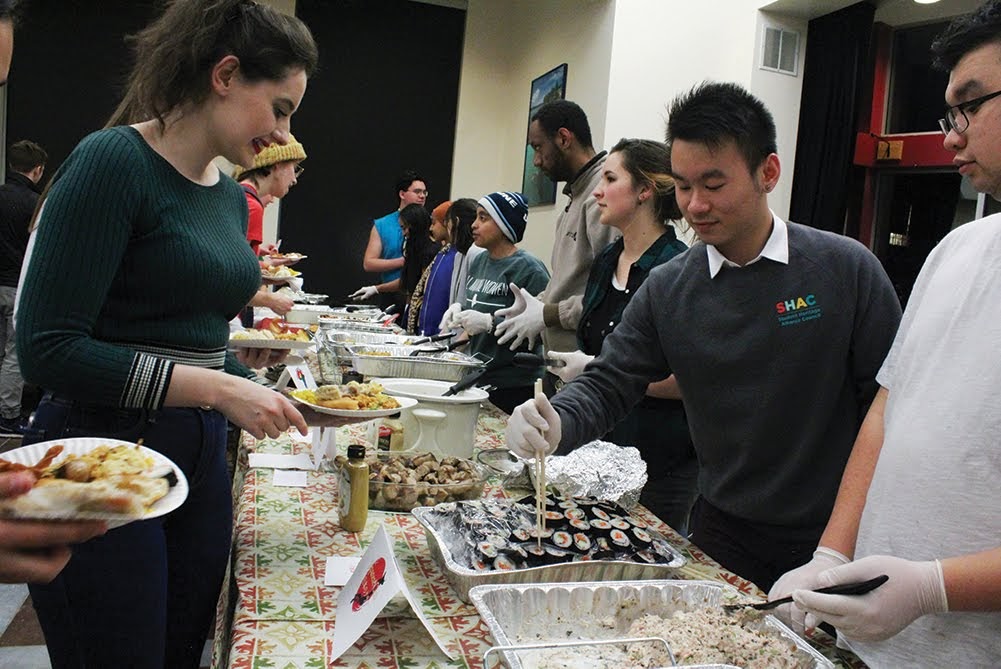On Thursday, Nov. 14, over 100 students and faculty members gathered in the North Pod and Bear’s Den of the Memorial Union to partake in the University of Maine Multicultural Thanksgiving. Organized by the Office of Diversity and Inclusion and the Student Heritage Alliance Council (SHAC), the Multicultural Thanksgiving featured a pot-luck style dinner, entertainment and presentations. The event was designed to create a dialogue and awareness around the history of Thanksgiving, as well as give students who may or may not be able to go home over Thanksgiving break a home-cooked meal.
Maulian Dana began the evening with a reminder that the University of Maine is located on Penobscot territory and that it is pertinent to maintain and build upon our relationship with the Penobscot nation and the surrounding community. Dana is the Penobscot Nation’s tribal ambassador and does work rooted in activism to advocate for Native Americans. She recently worked on legislation that outlawed the use of Native American mascots in the state of Maine and legislation that changed Columbus Day to Indigenous Peoples Day. Her work as an activist served as a reminder that we still have work to do in our representation and treatment of native communities. Maine is currently only one of six states that recognize Indigenous People’s Day.
Following Dana’s remarks, attendees lined up throughout the Bear’s Den to enjoy food prepared by SHAC and its members. SHAC is comprised of multiple student associations, and for the event, each association prepared traditional meals from different parts of the world. A lot of cultures can be represented and defined by their food, which makes it a great way to connect people from different ethnicities, religions and backgrounds.
“I think this represents a thanksgiving, but a more inclusive one. Food connects people and I spoke with Maulian Dana beforehand and we all agree that food is really important to connect people,” Alex Torno, vice president of SHAC and a graduate student studying French, said. “I feel that this is a way to connect a lot of people. Especially with [political] tension … even if you don’t want to reach out or meet new people, being around different cultures and people helps create a conversation.”
SHAC groups, including the Asian Student Association, French Club, Japanese Club, Hillel, German Club, Muslim Student’s Association and the Southeast Asian Student Association prepared home-made foods that are traditional in their cultures. Tables were sprawling with tacos, crepes, sushi, curry and rice, African rice, traditional Jewish foods, German sausage and traditional American Thanksgiving foods like mashed potatoes and baked beans.
November is Native American Heritage Month and Nov. 23 is Native American Heritage Day. It is important to understand and recognize the contentious history of Thanksgiving. The dominant historical story of Thanksgiving has largely been told from the perspective of European colonists. The meeting between the English settlers and the Native Americans was supposedly peaceful and friendly, as the two groups joined together over food.
But for Native Americans, the arrival of the English marked a turning point in history, when their world was no longer theirs. After centuries of massacres, diseases and famines, and the confiscation of their land, Native cultures have been reduced to fractions of what they once were. Their culture has been stereotyped furthered by mascots and costumes that lump all Native peoples into one generalized culture.
The story of Thanksgiving that has often been told in classrooms and picture books ignores the reality that Native people have faced. We are taught that it is acceptable to appropriate another culture, stereotype or use them as mascots and reject the reality of what happened in history following the arrival of the Europeans.
“When tribal nations are seen as sovereign bodies, we can work together toward a better relationship with other governments,” Dana said on the website Americans Who Tell The Truth. “When cities and towns celebrate Indigenous Peoples Day, a foundation of trust and understanding can be created. When we are seen as people and not stereotypes or mascots, we can build on shared humanity. It is truly all about respect.”










